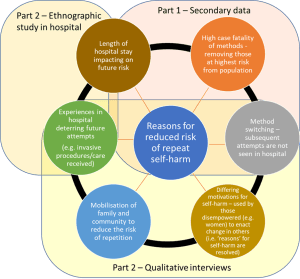Overview and aims:
Approximately 80% of all suicide deaths occur in low- and middle-income countries (LMICs), with 1-in-3 deaths occurring in south Asia. Despite the burden, our understanding about suicidal behaviour in these contexts is extremely limited. Suicide prevention efforts in these countries are informed by evidence generated from high income countries (HICs) where the epidemiological profile is different to LMICs. The relative importance of risk factors between these two contexts also differs. For example, a previous self-harm (regardless of intent) is a strong risk factor for suicide and repeat self-harm based on HIC evidence. However, interventions focused on reducing suicide by supporting those who self-harm are likely to be less useful in some LMICs; for example, in Sri Lanka where the risk of repeat self-harm is much lower than in HICs (3% versus 16% – 1 year risk.
The reasons why the risk of repeat self-harm is lower in south Asian countries is not well understood. One challenge is that many acts of self-harm with no or low suicidal intent are translated into a suicide death due to the availability of highly toxic pesticides. This has been thought to be one reason why self-harm repetition rates in LMICs are lower than in HICs (i.e. removing those with highest risk of repetition from the population). However, evidence from Sri Lanka where the case fatality associated with pesticide ingestion has dramatically reduced due to the enactment of highly toxic pesticide bans, preventing many low-intent suicide deaths, provides evidence against this hypothesis. Other explanations are likely to be more pertinent and warrant investigation.
Using a mixed methods study which utilises both existing data and collects new data in Sri Lanka we will explore what contributes to the lower rate of repeat self-harm.
Sample:
The study is being conducted in Sri Lanka and is split into two components. A secondary analysis of existing data and primary data collection from two different hospital settings (rural and urban). We will be collecting data from participant observations as well as interviewing people to present to these services following self-harm. Additionally to those individuals who have self-harmed and presented to hospital within 12 months, we will also be following up individuals who presented to services 10 years ago using an existing register of cases.
Methods:
The first part uses an established self-harm cohort in rural Sri Lanka (n>5500) which will be used to explore whether certain characteristics (i.e. method) and experiences (i.e. length of stay) following self-harm presentation to hospital, influences the risk of hospital re-presentation. Using this cohort, as well as a community sample of 14,000 households, we will investigate whether method switching occurs in subsequent self-harm attempts, and if this influences the likelihood of hospital re-presentation. Previous studies of self-harm repetition, in any context, have not looked at community repeat self-harm and therefore this aspect of the project is particularly novel.
The second part includes a focused ethnographic study of a rural and urban ward where self-harm patients are treated, to document their experiences of healthcare. This will be supplemented by follow-up interviews (n=45) with people who have self-harmed recently and presented to hospital or 10 years ago to explore whether their experiences of healthcare and responses of family and community influences their risk of repeat self-harm.
Project team:
- University of Bristol, UK: Duleeka Knipe (PI); Jane Derges; Paul Moran
- SACTRC, University of Peradeniya, Sri Lanka: Thilini Rajapakse, Tharuka Ushani, Lakmini De Silva, Imalsha Wickramasuriya, Piumee Bandara
- University of Edinburgh, UK: Michael Eddleston, Melissa Pearson
- Manchester University, UK: Catherine Robinson
Funders/Supporters
This study is funded by the American Foundation for Suicide Prevention
Publications and other outputs:
This study does not currently have any related publications or outputs. We hope to add some soon
Contact for further details: dee.knipe@bristol.ac.uk



